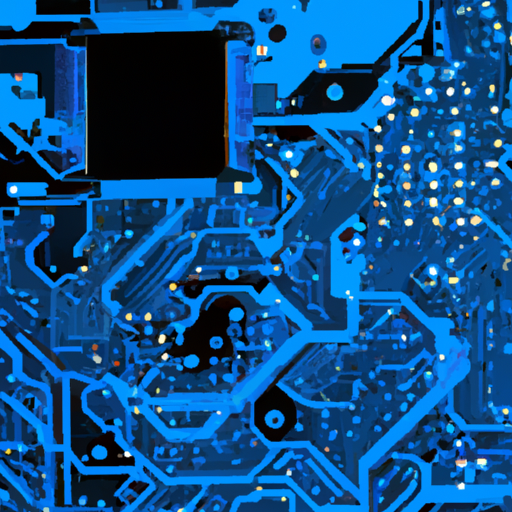Why do we need AI? Why AI is Essential for the Future

Why do we need AI? In our ever-evolving world, one thing is certain: the future holds exciting possibilities, and artificial intelligence (AI) is at the forefront of this transformation. AI, with its immense potential and capabilities, has quickly become an essential component for shaping our future.
From enhancing productivity to revolutionizing industries, AI has the power to reshape the way we live, work, and interact. In this article, we will explore the reasons why AI is vital for the future and why its adoption is not only beneficial but also imperative for progress.
So, let’s embark on this journey together and discover the captivating world of AI.
Enhancing Efficiency and Productivity
Automated Processes
Artificial Intelligence (AI) technologies play a pivotal role in enhancing efficiency and productivity across various sectors. By utilizing AI algorithms and intelligent systems, organizations can automate their processes, reducing the need for manual intervention. Tasks that are repetitive, time-consuming, and prone to human error can now be efficiently handled by AI-powered systems, freeing up valuable time and resources for employees to focus on more complex and strategic activities. Automation also contributes to faster and more accurate completion of tasks, leading to increased efficiency and productivity.
Improved Decision-making
AI systems have the capability to analyze vast volumes of data and extract valuable insights that can inform decision-making processes. By processing and interpreting complex information, AI algorithms enable organizations to make more informed, data-driven decisions. Through advanced machine learning techniques, AI systems can identify patterns, trends, and correlations within data sets, providing decision-makers with a comprehensive understanding of the variables at play. This empowers organizations to make timely and well-informed decisions, ultimately resulting in improved efficiency and increased productivity.
Streamlined Operations
The implementation of AI technologies enables organizations to streamline their operations by optimizing workflows and identifying bottlenecks. By analyzing historical data and real-time inputs, AI systems can identify inefficiencies, streamline processes, and suggest improvements to enhance overall operational performance. AI-powered software can also automate and streamline complex tasks, resulting in reduced costs, improved turnaround times, and enhanced overall operational efficiency. From supply chain management to customer service, AI is playing a crucial role in streamlining operations across a wide range of industries.

Driving Innovation and Advancements
Accelerating Research and Development
AI has the potential to significantly accelerate research and development (R&D) efforts across various fields. By leveraging AI technologies, researchers and scientists can enhance their capabilities to analyze large volumes of data, conduct simulations, and explore complex problem spaces. AI-powered algorithms can assist in identifying potential breakthroughs, optimizing experiments, and expediting the discovery of new solutions. The ability to accelerate R&D not only leads to scientific advancements but also drives innovation in industries, creating new opportunities for growth and development.
Facilitating Breakthroughs
AI has the potential to facilitate groundbreaking advancements and discoveries in diverse fields. By analyzing massive amounts of data and identifying patterns or anomalies, AI algorithms can assist researchers and scientists in uncovering new insights and making significant breakthroughs. AI-powered systems can also generate hypotheses and predictions that are beyond human capabilities, enabling scientists to explore uncharted territories. From medicine to astrophysics, AI is enabling breakthroughs that have the potential to transform our understanding of the world and drive innovation to unprecedented levels.
Unleashing Creativity
Contrary to popular belief, AI is not limited to analytical tasks alone. It can also contribute to unleashing creativity and supporting artistic endeavors. AI algorithms can generate original pieces of music, create realistic visual art, and even assist in the development of innovative storytelling techniques. By analyzing vast amounts of existing creative works, AI systems can identify patterns and generate novel ideas, providing artists and creatives with new sources of inspiration. The fusion of human creativity and AI capabilities has the potential to revolutionize the creative industry, pushing the boundaries of what is possible in terms of artistic expression.
Transforming Industries
Revolutionizing Healthcare
AI is revolutionizing the healthcare industry by augmenting medical diagnostics, treatment planning, and patient care. By leveraging AI algorithms, medical professionals can analyze large volumes of patient data, identify patterns, and make accurate diagnoses. AI-powered medical imaging technologies can detect anomalies and assist in early detection of diseases, leading to improved patient outcomes. Additionally, AI-enabled telemedicine solutions allow for remote consultations and monitoring, improving access to healthcare services. With AI, healthcare organizations can enhance efficiency, reduce medical errors, and deliver personalized care to patients.
Revamping Transportation
AI is reshaping the transportation industry by introducing advancements in autonomous vehicles, traffic management, and logistics. Self-driving cars and trucks powered by AI technologies have the potential to enhance road safety, reduce traffic congestion, and optimize fuel consumption. AI algorithms can analyze real-time traffic data, predict traffic patterns, and optimize routes, resulting in more efficient transportation systems. Smart transportation infrastructure, enabled by AI, can improve urban planning, enhance public transportation services, and create sustainable mobility solutions for the future.
Optimizing Manufacturing
AI technologies are transforming traditional manufacturing processes by enabling automation, predictive maintenance, and quality control. AI-powered robots and cobots can perform repetitive and physically demanding tasks, increasing productivity and reducing human error. Machine learning algorithms can analyze sensor data and predict equipment failures, enabling proactive maintenance and reducing unplanned downtime. AI systems can also monitor and optimize production processes, ensuring consistent product quality and driving efficiency in manufacturing operations. By embracing AI, manufacturers can achieve higher production output, improved product quality, and reduced costs.
Disrupting Finance
AI is disrupting the financial industry, revolutionizing areas such as fraud detection, risk assessment, and personalized banking. AI-powered algorithms can analyze vast amounts of financial data in real-time, detecting fraudulent activities and protecting financial systems. Machine learning models can assess creditworthiness, allowing for more accurate risk assessment and lending decisions. AI chatbots and virtual assistants provide personalized banking experiences, offering customers quick and efficient support. By leveraging AI, financial institutions can enhance security, optimize decision-making processes, and deliver customized services to their customers.
Revitalizing Retail
The retail industry is undergoing a transformation with the integration of AI technologies. AI-powered recommendation systems analyze customer preferences and behaviors to provide hyper-personalized product recommendations, increasing conversion rates and customer satisfaction. Computer vision technology allows for cashier-less stores and seamless checkout experiences. AI-powered inventory management systems assist in demand forecasting, optimizing stock levels, and reducing waste. By embracing AI, retailers can enhance customer experiences, streamline operations, and gain a competitive edge in an increasingly digital marketplace.
Modernizing Agriculture
AI is playing a crucial role in modernizing the agricultural sector, addressing challenges such as food security, yield optimization, and sustainable farming practices. AI-powered drones and satellite imagery enable farmers to monitor crop health, detect pests and diseases, and optimize irrigation and fertilization practices. Machine learning algorithms can analyze historical and real-time data to provide accurate crop yield predictions, enabling farmers to make informed decisions about planting, harvesting, and resource allocation. By leveraging AI, agriculture can become more precise, efficient, and sustainable, ensuring long-term viability and meeting the demands of a growing population.
Improving Decision-making and Problem-solving
Data-driven Insights
AI enables organizations to leverage the power of data by extracting valuable insights and patterns. By analyzing large volumes of data from various sources, AI algorithms can uncover hidden relationships and generate actionable insights for decision-making. Whether it’s customer behavior analysis or market trend identification, AI helps organizations make data-driven decisions that result in improved efficiency, increased competitiveness, and better outcomes.
Enhanced Accuracy
By removing human biases and errors, AI systems contribute to enhanced accuracy in decision-making and problem-solving. AI algorithms can process vast amounts of information quickly and objectively, reducing the risk of human error and biases that might influence judgment. In fields such as medical diagnosis and financial forecasting, AI can provide more reliable and accurate results, ensuring better outcomes and minimizing potential risks.
Identifying Patterns and Trends
AI enables organizations to identify patterns and trends within vast data sets that may not be readily apparent to humans. Through advanced data analysis techniques, AI algorithms can reveal correlations, trends, and patterns that can inform decision-making processes. By understanding these patterns and utilizing them, organizations can optimize their strategies, predict future outcomes, and stay ahead of the competition.
Risk Assessment
AI-powered risk assessment models enhance decision-making processes by better understanding and quantifying potential risks. By analyzing historical data, AI algorithms can identify risk factors, probabilities, and potential mitigations. This allows organizations to make informed decisions by evaluating potential risks and benefits, enabling more effective risk management strategies.

Enabling Personalization and Customization
Tailored Experiences
AI enables organizations to deliver tailored experiences to their customers by understanding their preferences and behaviors. By utilizing personalized data analytics and machine learning algorithms, organizations can create customized products, services, and marketing campaigns that resonate with individual customers. This leads to higher customer satisfaction, increased loyalty, and improved business outcomes.
Hyper-personalized Recommendations
AI-powered recommendation systems have become integral parts of many online platforms, providing hyper-personalized suggestions to users. By analyzing user behavior, preferences, and historical data, AI algorithms can recommend products, services, and content that are relevant and appealing to each individual. This level of personalization enhances user experiences, increases engagement, and drives conversions.
Individualized Services
AI enables organizations to provide individualized services by understanding and adapting to each customer’s unique needs. AI-powered chatbots and virtual assistants can provide personalized support and assistance, answering customer queries and resolving issues in a timely and efficient manner. This level of individualized service not only enhances customer satisfaction but also reduces operational costs for organizations.
Promoting Safety and Security
Cybersecurity
As technology advances, so do the risks associated with cybersecurity. AI plays a crucial role in addressing these challenges by identifying and preventing potential threats. AI algorithms can analyze large volumes of data and patterns to detect anomalies and potential cyberattacks. By leveraging machine learning, AI systems can continuously learn from new threats and adapt to evolving cybersecurity risks.
Surveillance Systems
AI-powered surveillance systems enhance safety and security by monitoring and analyzing video feeds in real-time. By utilizing computer vision algorithms, AI systems can detect suspicious activities, identify objects or individuals of interest, and send timely alerts to security personnel. These systems contribute to the prevention and detection of crimes, ensuring public safety in various environments.
Preventing Accidents and Hazards
AI technologies are being employed to prevent accidents and mitigate hazards in various industries. In the automotive sector, AI-powered systems enable advanced driver-assistance features, such as collision avoidance and lane departure warnings, reducing the risk of accidents. In industrial settings, AI algorithms can monitor and analyze sensor data to detect anomalies, predict equipment failures, and prevent potential accidents or hazards. By proactively identifying risks and taking preventive actions, AI helps enhance safety in different environments.

Boosting Economic Growth and Employment
Job Creation
Contrary to the perception of AI taking away jobs, it has the potential to create new job opportunities. As organizations adopt AI technologies, new roles and positions are emerging, requiring individuals with expertise in AI development, implementation, and management. AI also has the potential to enhance job productivity and efficiency, allowing employees to focus on more complex and creative tasks that require human skills.
Increased Revenue
By improving efficiency, streamlining operations, and providing personalized experiences, AI contributes to increased revenue for organizations. AI-powered recommendation systems, for example, can drive sales by suggesting products or services that align with each customer’s preferences. AI-powered marketing campaigns can also target specific customer segments effectively, resulting in improved conversion rates and higher revenue generation.
Efficient Resource Allocation
AI algorithms enable organizations to optimize resource allocation by analyzing data and identifying areas of improvement. By understanding demand patterns and forecasting future needs, organizations can allocate resources more efficiently, reducing waste and maximizing productivity. This optimized resource allocation helps organizations achieve higher profitability and drive economic growth.
Alleviating Human Workload
Automating Repetitive Tasks
AI technologies automate repetitive and mundane tasks, alleviating the workload on human employees. From data entry to report generation, AI-powered systems can handle routine tasks more efficiently, freeing up employees’ time and energy. This allows employees to focus on tasks that require creativity, critical thinking, and strategic decision-making.
Freeing Up Time
By automating time-consuming tasks, AI frees up valuable time for employees, enabling them to invest their efforts into higher-value activities. Employees can dedicate more time to innovation, problem-solving, and collaboration, leading to increased productivity and job satisfaction. This ultimately contributes to a more engaged and motivated workforce.
Minimizing Human Error
Human errors can have significant consequences in various domains, leading to financial losses, safety hazards, and operational setbacks. AI technologies drastically reduce the likelihood of human error by automating tasks and enhancing accuracy. AI systems can tirelessly analyze data, perform calculations, and identify errors or anomalies that might be missed by human operators. By minimizing human error, AI contributes to the overall efficiency and effectiveness of operations.

Addressing Global Challenges
Climate Change Mitigation
AI can contribute to mitigating climate change by analyzing environmental data, predicting climate patterns, and facilitating sustainable practices. AI algorithms enable the efficient monitoring of energy consumption, optimize renewable energy generation, and assist in climate modeling. By leveraging AI technologies, organizations and policymakers can make informed decisions that minimize the environmental impact and drive sustainable development.
Sustainable Development
AI technologies have the potential to drive sustainable development across various sectors. By optimizing resource allocation and minimizing waste, AI contributes to more efficient and sustainable practices in industries such as manufacturing, agriculture, and energy. AI can also assist in urban planning by analyzing data and predicting population trends, enabling the development of smart and sustainable cities.
Improving Healthcare Access
AI can address the global challenge of improving healthcare access by bridging gaps in healthcare delivery. Through telemedicine solutions, AI enables remote consultations, diagnosis, and monitoring, bringing healthcare services to underserved areas. AI algorithms can also assist in detecting diseases at an early stage, improving outcomes and reducing healthcare costs. By leveraging AI, healthcare can become more accessible, equitable, and efficient, ensuring better health outcomes for all.
Enhancing Education
AI technologies have the potential to transform education by personalizing learning experiences and improving access to quality education. AI-powered adaptive learning platforms can tailor educational content and pace to individual students, catering to their unique learning styles and needs. AI can also automate administrative tasks for educators, reducing their workload and providing more time for instruction. By leveraging AI in education, we can enhance learning outcomes, bridge educational gaps, and promote lifelong learning.
Ethical Considerations and Safeguards
Transparency and Explainability
As AI technologies become more prevalent, it is crucial to ensure transparency and explainability in their decision-making processes. Organizations and developers need to adopt ethical AI practices that prioritize transparency, fairness, and accountability. AI systems should be designed to provide explanations for their decisions and actions, instilling trust in users and minimizing potential biases or discriminatory outcomes.
Data Privacy
AI relies on vast amounts of data for training and decision-making. It is essential to prioritize data privacy and protect individuals’ personal information. Organizations must adhere to robust data privacy regulations and best practices to safeguard sensitive data. By ensuring data privacy, AI technologies can continue to deliver value while respecting individuals’ rights and maintaining public trust.
Bias and Discrimination
AI algorithms can inadvertently perpetuate biases and discrimination present in the data they are trained on. It is crucial to address these issues by actively working to identify and mitigate biases in AI systems. Developers and organizations need to adopt rigorous evaluation processes to ensure fairness and inclusivity in AI decision-making. By addressing bias and discrimination, AI can contribute to a more equitable and inclusive society.
Wrap Up
AI technologies are essential for the future as they bring countless benefits across various domains. From enhancing efficiency and productivity to driving innovation and advancements, AI is transforming industries and improving decision-making processes. It enables personalization and customization, promotes safety and security, and plays a vital role in addressing global challenges.
However, it is essential to consider ethical considerations and safeguards to ensure that AI technologies are deployed responsibly and inclusively, prioritizing transparency, fairness, and privacy. With the right approach, AI has the potential to revolutionize how we live, work, and address the challenges of tomorrow.
FAQ: Why do we need AI
Q: What is AI?
A: AI, or Artificial Intelligence, refers to the simulation of human intelligence in machines that are programmed to think, learn, and problem-solve like humans.
Q: Why is AI important?
A: AI is crucial because it can analyze vast amounts of data, make predictions, automate tasks, and solve complex problems more efficiently than humans, leading to improved decision-making and increased productivity.
Q: How does AI benefit society?
A: AI has numerous societal benefits, such as improving healthcare through more accurate diagnoses, enhancing transportation systems with autonomous vehicles, increasing cybersecurity, personalizing education, and facilitating daily tasks in smart homes.
Q: Can AI help businesses?
A: Absolutely. AI enables businesses to streamline operations, automate manual tasks, gain insights from data, improve customer experiences, and develop innovative products and services. It can significantly enhance efficiency and profitability.
Q: Are there any potential risks associated with AI?
A: While AI offers many advantages, there are concerns about its risks as well. These include job displacement due to automation, privacy and security issues, biases in algorithms, and the potential for AI to be used maliciously. Responsible development and regulation are important to mitigate these risks.
Q: What industries benefit from AI?
A: AI has applications in various industries including healthcare, finance, manufacturing, retail, transportation, agriculture, and entertainment. Its versatility allows it to drive advancements and improvements in diverse sectors.
Q: How does AI contribute to healthcare?
A: AI contributes to healthcare by providing accurate diagnoses, analyzing medical images efficiently, developing personalized treatments, predicting outbreaks, and assisting in drug discovery. It can significantly improve patient outcomes and revolutionize the healthcare industry.
Q: Will AI replace human jobs?
A: AI has the potential to automate routine and repetitive tasks, which may lead to job displacement in certain areas. However, it also creates new job opportunities, especially in areas that require human creativity, critical thinking, emotional intelligence, and complex problem-solving skills.
Q: How can individuals learn about AI?
A: Individuals interested in AI can take online courses, attend workshops or conferences, join AI communities, read books and articles, participate in AI projects, and follow reputable sources and experts in the field. Continuous learning is essential due to its evolving nature.
Q: What is the future of AI?
A: The future of AI holds immense possibilities. We can expect advancements in areas such as autonomous vehicles, robotics, natural language processing, machine learning, and deep learning. AI will continue to transform industries and reshape the world around us.
